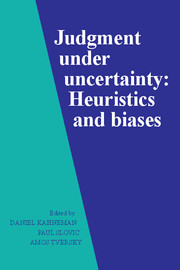Book contents
- Frontmatter
- Contents
- List of contributors
- Preface
- Part I Introduction
- Part II Representativeness
- 2 Belief in the law of small numbers
- 3 Subjective probability: A judgment of representativeness
- 4 On the psychology of prediction
- 5 Studies of representativeness
- 6 Judgments of and by representativeness
- Part III Causality and attribution
- Part IV Availability
- Part V Covariation and control
- Part VI Overconfidence
- Part VII Multistage evaluation
- Part VIII Corrective procedures
- Part IX Risk perception
- Part X Postscript
- References
- Index
2 - Belief in the law of small numbers
Published online by Cambridge University Press: 05 May 2013
- Frontmatter
- Contents
- List of contributors
- Preface
- Part I Introduction
- Part II Representativeness
- 2 Belief in the law of small numbers
- 3 Subjective probability: A judgment of representativeness
- 4 On the psychology of prediction
- 5 Studies of representativeness
- 6 Judgments of and by representativeness
- Part III Causality and attribution
- Part IV Availability
- Part V Covariation and control
- Part VI Overconfidence
- Part VII Multistage evaluation
- Part VIII Corrective procedures
- Part IX Risk perception
- Part X Postscript
- References
- Index
Summary
“Suppose you have run an experiment on 20 subjects, and have obtained a significant result which confirms your theory (z = 2.23, p < .05, two tailed). You now have cause to run an additional group of 10 subjects. What do you think the probability is that the results will be significant, by a one-tailed test, separately for this group?”
If you feel that the probability is somewhere around .85, you may be pleased to know that you belong to a majority group. Indeed, that was the median answer of two small groups who were kind enough to respond to a questionnaire distributed at meetings of the Mathematical Psychology Group and of the American Psychological Association.
On the other hand, if you feel that the probability is around .48, you belong to a minority. Only 9 of our 84 respondents gave answers between .40 and .60. However, .48 happens to be a much more reasonable estimate than .85.
Apparently, most psychologists have an exaggerated belief in the likelihood of successfully replicating an obtained finding. The sources of such beliefs, and their consequences for the conduct of scientific inquiry, are what this paper is about. Our thesis is that people have strong intuitions about random sampling; that these intuitions are wrong in fundamental respects; that these intuitions are shared by naive subjects and by trained scientists; and that they are applied with unfortunate consequences in the course of scientific inquiry.
- Type
- Chapter
- Information
- Judgment under UncertaintyHeuristics and Biases, pp. 23 - 31Publisher: Cambridge University PressPrint publication year: 1982
- 40
- Cited by



